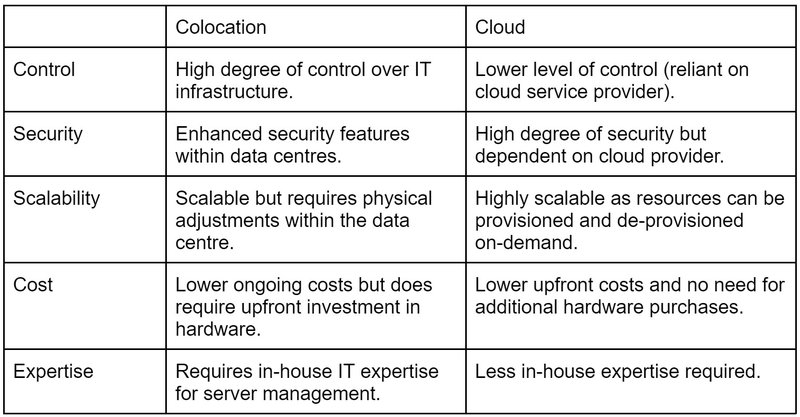Colocation vs cloud: Which is best for your business
July 24, 2024
Modern South African businesses depend on a robust IT infrastructure to run smoothly. This involves handling and keeping track of important data on network hardware and servers. Choosing the right platform for this infrastructure can be challenging, with colocation and cloud networking emerging as the two primary choices.
So what is colocation? Simply put, it’s the process of storing your data in dedicated server rooms or shared rack space in a safe, controlled data centre that is owned by a third-party operator. These facilities provide several significant benefits for companies of all sizes since they are painstakingly built to satisfy the exacting requirements of IT equipment.
Colocation comes with enhanced security as data centres prioritise security by utilising generators and solar power sources, sophisticated access control systems, and round-the-clock surveillance.
Building and maintaining your own data centre requires a significant upfront cost, which is not necessary with colocation. You only pay for the services and space you use, which frees up funds for your main line of business. Your IT requirements will also grow as your company expands. Colocation provides adaptable options that let you quickly increase or decrease your server's bandwidth and space as needed.
Cloud networking: Adaptability and services on-demand
On the other hand, cloud networking makes use of a virtualised IT environment. Remote servers are run by cloud service providers which house your data and apps. Through the internet, businesses can access these resources and apps.
Cloud networking also has several advantages for businesses. The on-demand provisioning and de-provisioning of cloud resources enables immediate scalability in response to changing demands. This is perfect for companies whose workloads change frequently.
Like colocation, there are no massive infrastructure costs for on-premise software or hardware. Cloud solutions allow companies to only pay for the resources used, making them appealing to startups and companies with lower cash availability.
Comparing colocation vs cloud: Advantages and disadvantages
While cloud computing and colocation both have benefits, knowing the main distinctions between the two will help you make the best choice for your company:

Selecting the best option for your business
The best decision between cloud computing and colocation will rely on a number of criteria unique to your company. Below is a summary of the potential best-fit solutions for various scenarios:
1) Medium and large enterprises - Colocation provides more control, security, and customisation for companies with massive datasets, mission-critical applications, or stringent regulatory compliance requirements. This may be especially important for South African government agencies, financial organisations, and medical professionals.
2) Small and medium enterprises (SMEs) and startups - Cloud solutions provide an affordable and adaptable choice for companies with variable resource requirements and little initial investment. Because of this, they may increase their IT infrastructure as needed without having to make a big initial expenditure.
3) Hybrid strategy - A lot of companies choose to take a hybrid approach, using the cloud for non-essential workloads and apps that need to scale on-demand, and colocation for sensitive and core data and applications.
SEACOM is your resource for customised IT solutions
SEACOM is a leading ICT services provider in South Africa. We collaborate with top-tier data centres around the country, guaranteeing that your IT infrastructure takes advantage of the newest innovations and the strictest security regulations. We provide a range of colocation and cloud choices, from dedicated server rooms to shared rack space, so you can easily scale your IT infrastructure up or down as your business grows.
To reduce the chance of downtime, SEACOM's data centre partners prioritise the security of your data with sophisticated access control systems, round-the-clock surveillance, biometric authentication, and redundant power supplies.
We provide access to our vast national and international network infrastructure as well as fast, dependable network connectivity inside the data centres. This guarantees your business apps operate at their best and allows you to transfer data seamlessly.
For any South African company, deciding between colocation and cloud networking is a strategic move. By understanding the advantages and disadvantages of both options and taking into account your unique requirements concerning security, scalability, and affordability, you can make a well-informed decision that enables your company to prosper.
Whether colocation, the cloud, or a hybrid strategy is the greatest fit for your particular scenario, we'll work together to evaluate your needs and suggest the best course of action. For more information about these services or to get a quote, email us at marketing@seacom.com or leave us a message.
SEACOM owns Africa’s most extensive network of information and communications technology (ICT) infrastructure, including subsea cables and secure internet connections. We offer a diverse range of flexible, scalable and high-quality solutions for businesses that meet world-class standards for connectivity.
SEACOM is privately owned and operated, making it agile and adaptable to the needs of the customer. This makes us the preferred ICT and internet connectivity partner for African businesses and peripheral service providers. We can guarantee high-speed, low-latency and secure internet connections to corporates and small enterprises.
For more information on our internet and voice solutions, follow us on LinkedIn, Facebook or X. Keep an eye on our news section for insightful articles and relevant news stories on African ICT, internet connectivity and our leading cloud and security solutions.
In other news
Site by UNOMENA | © 2025 SEACOM. All rights reserved.
